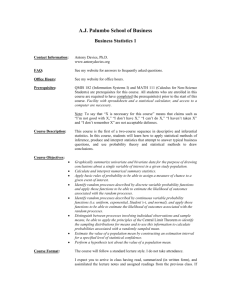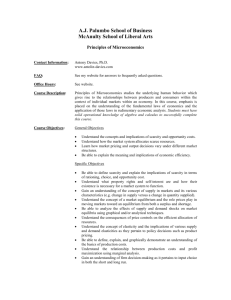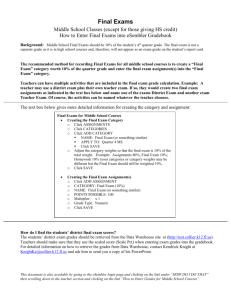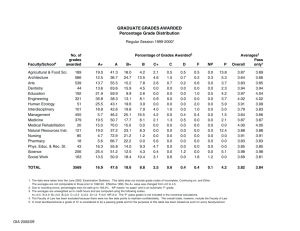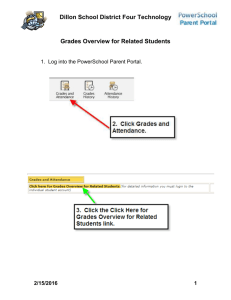syllabus - Antony Davies
advertisement
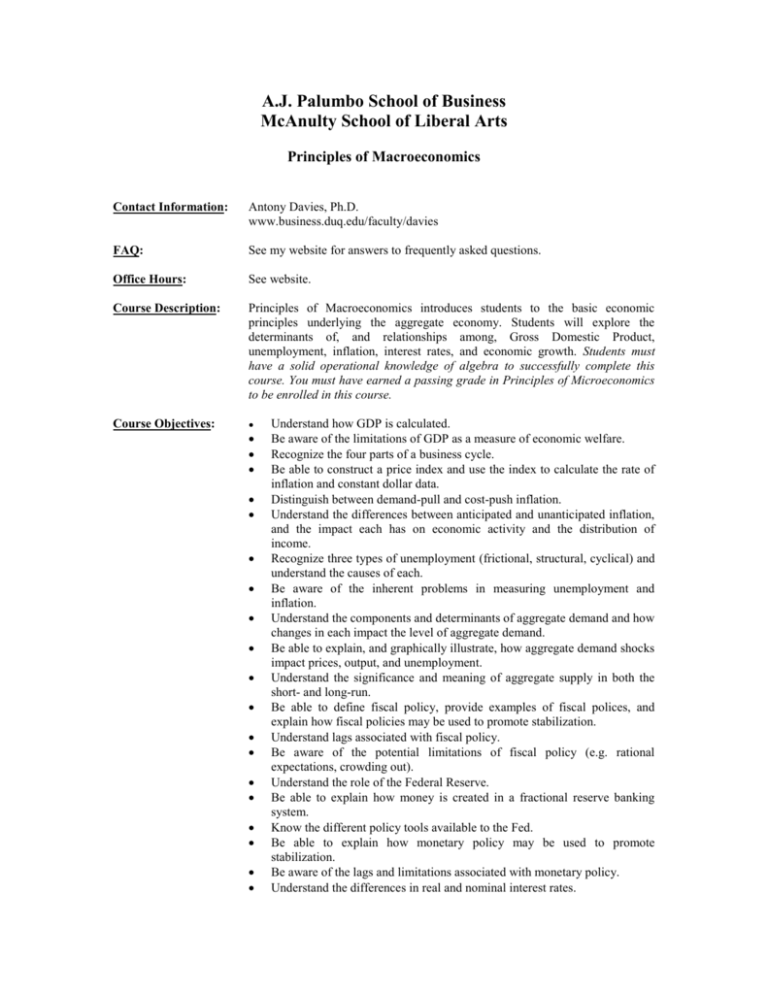
A.J. Palumbo School of Business McAnulty School of Liberal Arts Principles of Macroeconomics Contact Information: Antony Davies, Ph.D. www.business.duq.edu/faculty/davies FAQ: See my website for answers to frequently asked questions. Office Hours: See website. Course Description: Principles of Macroeconomics introduces students to the basic economic principles underlying the aggregate economy. Students will explore the determinants of, and relationships among, Gross Domestic Product, unemployment, inflation, interest rates, and economic growth. Students must have a solid operational knowledge of algebra to successfully complete this course. You must have earned a passing grade in Principles of Microeconomics to be enrolled in this course. Course Objectives: ● Understand how GDP is calculated. Be aware of the limitations of GDP as a measure of economic welfare. Recognize the four parts of a business cycle. Be able to construct a price index and use the index to calculate the rate of inflation and constant dollar data. Distinguish between demand-pull and cost-push inflation. Understand the differences between anticipated and unanticipated inflation, and the impact each has on economic activity and the distribution of income. Recognize three types of unemployment (frictional, structural, cyclical) and understand the causes of each. Be aware of the inherent problems in measuring unemployment and inflation. Understand the components and determinants of aggregate demand and how changes in each impact the level of aggregate demand. Be able to explain, and graphically illustrate, how aggregate demand shocks impact prices, output, and unemployment. Understand the significance and meaning of aggregate supply in both the short- and long-run. Be able to define fiscal policy, provide examples of fiscal polices, and explain how fiscal policies may be used to promote stabilization. Understand lags associated with fiscal policy. Be aware of the potential limitations of fiscal policy (e.g. rational expectations, crowding out). Understand the role of the Federal Reserve. Be able to explain how money is created in a fractional reserve banking system. Know the different policy tools available to the Fed. Be able to explain how monetary policy may be used to promote stabilization. Be aware of the lags and limitations associated with monetary policy. Understand the differences in real and nominal interest rates. Have an appreciation for the basic philosophical differences between policy activists and non-activists. Understand the basics of the foreign exchange market. Understand how exchange rates influence both imports and exports. Prerequisites: MATH 101 (College Algebra) and ECON 201 (Principles of Microeconomics) are prerequisites for this course. You must have earned a passing grade in Principles of Microeconomics to be enrolled in this course. Course Format: The course will follow a standard lecture style. I do not take attendance. I expect you to arrive in class having read, summarized (in written form), and assimilated the lecture notes and assigned readings from the previous class. If you miss a class, it is your responsibility to obtain the relevant notes and assignments from another student. Look at the Course FAQ on the web site under the question “What can I do to earn a better grade in your course?” for more information. WARNING: If you do not carefully re-read and re-write your lecture notes after every class and keep up with the assigned readings and homework, you will seriously jeopardize your ability to pass this course. For details on how I expect you to study for this course, go to Readings: See website. Grading: Your grade for the course derives from four sources (weights are shown in parentheses): two non-cumulative exams (30%), one cumulative mid-term exam (30%), one cumulative final exam (30%), and participation and homework (10%). The percentage grades required for each letter grade are: 93% 90% 86% 83% A AB+ B 80% 76% 70% 65% BC+ C D For those students who find themselves at the border between grade levels, I do round off course grades to the closest whole percentage, but I do not give partial points to bump students to the next grade level. The above percentage grades are the minimums acceptable for the corresponding letter grades. Based on past student performance, the probability of a student obtaining a given grade in this course is as follows: Probability of earning A or AProbability of earning B-, B, or B+ Probability of earning C, or C+ Probability of earning D or F 10% 20% 40% 30% Note: A-level grades are reserved for what I consider to be near perfect performance. Earning an A-level grade in this course is uncommon. Students will receive grades in a timely fashion. Students are expected to keep track of their own grades throughout the semester. I report final course grades only to the registrar. A student who wishes to challenge my grading of a particular exam must do so in a timely fashion. With the exception of mathematical error on my part, I shall not alter exam grades after I have computed course grades. Non-Cumulative Exams: See Calendar of Events on my website for the exam schedule. Non-Cumulative Exams will be composed of multiple-choice, singleanswer, essay, and/or problem style questions. Material for the exams will come from all lectures and assigned readings covered since the previous exam. A student who misses the exam without valid cause (see definition below) or preapproval from me receives a zero for the exam. WARNING: I do not give make-up exams. The exam schedule appears below. I expect you to adjust your schedule appropriately. If you miss an exam without valid cause (see definition below) or without pre-approval from me, you will receive a zero for that exam. If you miss an exam with valid cause or preapproval, you will not receive a make-up exam. Instead, I will adjust the weights of the remaining components of your grade accordingly. Mid-Term Exam: See Calendar of Events on my website for the exam schedule. The Mid-Term Exam will be composed of multiple-choice, singleanswer, essay, and/or problem style questions. Material for the exam will come from all lectures and assigned readings covered since the beginning of the semester. A student who misses the exam without valid cause (see definition below) or pre-approval from me receives a zero for the exam. Final Exam: See Calendar of Events on my website for the exam schedule. The Final Exam will be composed of multiple-choice questions. Material for the exam will come from all lectures and assigned readings covered since the beginning of the semester. A student who misses the exam without valid cause (see definition below) or pre-approval from me receives a zero for the exam. Valid Cause for Missing An Exam: A cause is considered valid if (1) the cause for missing the exam is an emergency that prevents you from attending the exam, and (2) the nature of the emergency precludes your attaining pre-approval for the absence. WARNING: Because the calendar of events (see web site) is given to you at the beginning of the semester, travel arrangements are not considered valid cause for missing an exam. Participation and Homework: Participation includes class discussion, discussion outside of class hours (including e-mail), and completing homework assignments. Class discussion includes both asking pertinent questions and providing insightful comments. Students who are reluctant to ask questions in class can obtain participation points by participating in discussion outside of class either in person or via e-mail. The Safety Net: It is a fact that different students learn at different rates. It is also the case that, on average, students must spend a tremendous amount of effort studying economics before they begin to see a pay-off in terms of improved exam performance. My goal in evaluating your performance in this course is not to measure the rate at which you learn, but to measure the total body of knowledge you have gained throughout the semester. To this end, because the final exam is cumulative, if the grade you earn on the final exam exceeds your course grade (as calculated above), I shall replace your course grade with your final exam grade. Note: If you have missed more than two or more exams, regardless of whether you missed the exams for valid reasons, you forfeit the “safety net” provision. Note: Occasionally, though virtually never in principles-level classes, I give students the option of a take-home final exam instead of an in-class exam. When offered, students who choose the take-home final forfeit the safety net described above. Note: Occasionally, I give students the option of completing exams in groups. I reserve the right to prohibit a student from working with a particular group if, in my opinion, the student’s abilities do not match those of the rest of the group. If the student cannot find another suitable group, then the student will work alone. Academic Integrity: Because the value of a degree lies in the reputation of the school which issued the degree, academic dishonesty on the part of one student devalues the degrees of all students: past, present, and future. In defense of these students, I deal most stringently with violations of academic integrity. A student who plagiarizes but admits the plagiary to me prior to my discovering it is guilty of a non-reprehensible violation of academic integrity. Such a student will receive a failing grade for the exam or assignment and no further penalty. A student who plagiarizes but does not admit the plagiary prior to my discovering it is guilty of a reprehensible violation of academic integrity. Such a student will immediately be excused from the course and will receive a failing grade for the course. In the case of a reprehensible violation, I shall also file a formal report of the incident with the Academic Dean. Plagiarism is defined as “The use, whether by summary, paraphrase, or direct quotation of the published or unpublished work or specific ideas of another person without full and clear acknowledgment. It also includes the use of materials prepared by another person or agency engaged in the selling or distribution of term papers or other academic materials.” See the Business School’s Code of Ethics on my website for more information. Disabilities: Students with disabilities who require accommodations in fulfilling the requirements for this course should notify me during the first week of class and provide me with a copy of their certifying letters. The certifying letter can be obtained from the Office of Disabled Student Services. Once notification is given, it is the student’s responsibility to request accommodations as needed. Calendar: See my website for a detailed listing of projected dates on which various topics will be covered.
